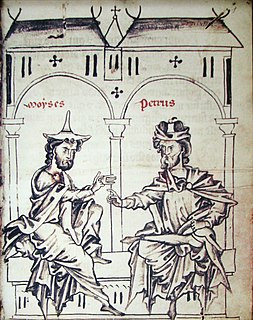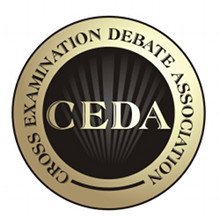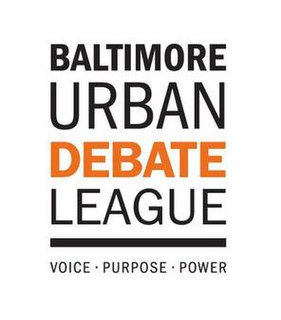
Debate is a process that involves formal discourse on a particular topic, often including a moderator and audience. In a debate, arguments are put forward for often opposing viewpoints. Debates have historically occurred in public meetings, academic institutions, debate halls, coffeehouses, competitions, and legislative assemblies. Debate has also been conducted for educational and recreational purposes, usually associated with educational establishments and debating societies. These debates put an emphasis upon logical consistency, factual accuracy, and emotional appeal to an audience. Modern forms of competitive debate also include rules for participants to discuss and decide upon the framework of the debate.
Lincoln–Douglas debate is a type of one-on-one competitive debate practiced mainly in the United States at the high school level. It is sometimes also called values debate because the format traditionally places a heavy emphasis on logic, ethical values, and philosophy. The Lincoln–Douglas debate format is named for the 1858 Lincoln–Douglas debates between Abraham Lincoln and Stephen A. Douglas, because their debates focused on slavery and the morals, values, and logic behind it. LD debates are used by the National Speech and Debate Association, or NSDA competitions, and also widely used in related debate leagues such as the National Christian Forensics and Communication Association, the National Catholic Forensic League, the National Educational Debate Association, the Texas University Interscholastic League, Texas Forensic Association, Stoa USA and their affiliated regional organizations. The vast majority of tournaments use the current NSDA resolution.
Policy debate is an American form of debate competition in which teams of two usually advocate for and against a resolution that typically calls for policy change by the United States federal government. It is also referred to as cross-examination debate because of the 3-minute questioning period following each constructive speech. Evidence presentation is a crucial part of Policy Debate; however, ethical arguments also play a major role in deciding the outcome of the round. The main argument being debated during a round of Cross Examination is which team has a greater impact. This factor alone can decide the winner of a round. Whichever team can prove the greater impact is likely to win the round. When a team explains why their impacts are "greater" than the opposition's impacts, they utilize the concept of "impact calculus." One team’s job is to argue that the resolution— the statement that we should make some specific change to address a national or international problem —is a good idea. Affirmative teams generally present a plan as a proposal for implementation of the resolution. On the other hand, the Negative teams present arguments against the implementation of the resolution. In a single round of debate competition, each person gives two speeches. The first speech each person gives is called a “constructive” speech, because it is the speech where each person constructs the basic arguments they will make throughout the debate. The second speech is called a “rebuttal”, because this is the speech were each person tries to rebut the arguments made by the other team, while using their own arguments to try to convince the judge to vote for their team. The Affirmative has to convince the judge to vote for a change, while the Negative has to convince the judge that the status quo is better than the hypothetical world in which the Affirmative's plan is implemented.
Congressional Debate is a competitive interscholastic high school debate event in the United States. The National Speech and Debate Association (NSDA), National Catholic Forensic League (NCFL) and many state associations and national invitational tournaments offer Congressional Debate as an event. Each organization and tournament offers its own rules, although the National Speech and Debate Association has championed standardization since 2007, when it began to ask its districts to use one of a number of procedures for qualification to its National Tournament. The Pakistan Student Congress event is a conference, and not interscholastic competition.
The American Parliamentary Debate Association (APDA) is the oldest intercollegiate parliamentary debating association in the United States. APDA sponsors over 50 tournaments a year, all in a parliamentary format, as well as a national championship in late April. It also administers the North American Debating Championship with the Canadian University Society for Intercollegiate Debate (CUSID) every year in January. Although it is mainly funded by its member universities, APDA is an entirely student-run organization.
The National Parliamentary Debate Association (NPDA) is one of the two national intercollegiate parliamentary debate organizations in the United States. The other is the American Parliamentary Debate Association. Its membership is national with participating schools throughout the country. In 2015, NAPA was the largest debating organization in the United States with around 200-250 participating schools in any given year.
Public Forum debate is a widespread form of middle and high school competitive debate which centers on current events and relies on both logic and evidence to construct arguments. Invented in the US, Public Forum is one of the most prominent American debate events, alongside policy debate and Lincoln-Douglas debate; it is also practiced in China and India, and has been recently introduced to Romania. Individuals give short speeches that are interspersed with 3 minute "Crossfire" sections, questions and answers between opposed debaters. The winner is determined by a judge who also serves as a referee. The debate centers on advocating or rejecting a position, "resolve", or "resolution", which is usually a proposal of a potential solution to a current events issue. Public Forum is designed to be accessible to the average citizen.

The Cross Examination Debate Association (CEDA) is the largest intercollegiate policy debate association in the United States. Throughout the school year, CEDA sanctions over 60 tournaments throughout the nation, including an annual National Championship Tournament that brings together over 175 individual debate teams from across the nation to compete on the basis of research, persuasive speaking, argumentation, and philosophy.
The National Debate Tournament is one of the national championships for collegiate policy debate in the United States. The tournament is sponsored by the American Forensic Association with the Ford Motor Company Fund.
The American Debate Association began in 1985 as an intercollegiate debate association. It uses the resolution selected by the Cross Examination Debate Association and the National Debate Tournament. Currently they have 40 member schools. Its current president is Danielle Verney-O'Gorman, Director of Debate at the United States Naval Academy.
Parliamentary debate is an academic debate event. Many university-level institutions in English-speaking nations sponsor parliamentary debate teams. In addition the format is currently spreading to the high school level. Despite the name, the parli is not related to debate in governmental parliaments beyond formal speaker titles such as "Opposition Leader" and "Prime Minister".
A counterplan is a component of debate theory commonly employed in the activity of parliamentary and policy debate. While some conceptions of debate theory require the negative position in a debate to defend the status quo against an affirmative position or plan, a counterplan allows the negative to defend a separate plan or an advocacy. It also allows the affirmative to run disadvantages against the negative.
Topicality is a stock issue in policy debate which pertains to whether or not the plan affirms the resolution as worded. To contest the topicality of the affirmative, the negative interprets a word or words in the resolution and argues that the affirmative does not meet that definition, that the interpretation is preferable, and that non-topicality should be a voting issue.
In all forms of policy debate, the order of speeches is as follows:
Inter-collegiate policy debate is a form of speech competition involving two teams of two debaters from different colleges or universities based on a resolution phrased as something the United States federal government "should" do. Policy debate also exists as a high school activity, with a very similar format, but different leagues, tournaments, speech times, resolutions, and styles.
In debate, which is a form of argument competition, a case, sometimes known as plan, is a textual advocacy presented, in form of speech, by the Pro team as a normative or "should" statement; it is generally presented in the First Pro Constructive (1AC). A case will often include either the resolution or a rephrasing of it.

The Baltimore Urban Debate League, is an American, non profit, urban debate league that aims to educate and mentor inner city middle school and high school students in the Baltimore, Maryland area.
Stoa USA, also referred to as Stoa, is a Christian homeschool forensics organization in the United States. It is one of the four major national high school forensics organizations: the others are the National Speech and Debate Association (NSDA), National Catholic Forensic League (NCFL), and the National Christian Forensics and Communications Association (NCFCA).
This is a glossary of policy debate terms.

Competitive debate, also known as forensics or speech and debate, has a history in the United States dating back to colonial times. There are a variety of debate formats, including Public Forum, Lincoln–Douglas, Policy, and British Parliamentary. The activity also encompasses many speaking events, including Oratory, Extemporaneous Speaking, and Dramatic Interpretation. Participation in competitive debate is associated with positive outcomes for competitors across a wide variety of metrics, including standardized test scores, civic engagement, and future career outcomes.




